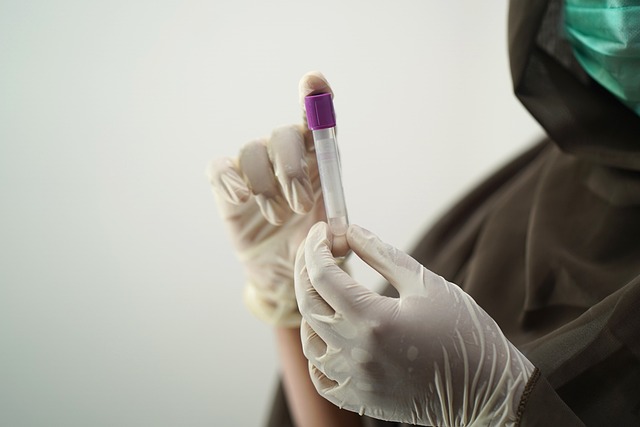The UK's healthcare system has revolutionized liver function testing with the introduction of a 'Blood Test at Home' service, allowing patients to self-collect blood samples for vital liver disease assessments. This innovative approach facilitates early detection and monitoring of liver conditions by measuring biomarkers such as ALT, AST, GGT, ALP, and bilirubin levels. The service enhances patient comfort and eases the burden on healthcare systems by reducing hospital visits, especially during times when in-person consultations are limited. Medical professionals guide patients through the sample collection process to ensure accuracy, and the NHS ensures secure handling from sample collection to lab analysis. These tests, overseen remotely via telemedicine, provide continuous care and monitoring, with results interpreted by healthcare professionals within the patient's broader clinical context. This service is particularly beneficial for individuals with mobility issues or those in remote areas, ensuring equitable access to liver health assessments across the UK. Strict protocols are followed to maintain test accuracy, with samples collected and transported under controlled conditions to CPA-accredited laboratories for analysis, thus supporting informed healthcare decisions and effective patient care.
Exploring the evolution of hepatic diagnostics, this article delves into the latest advancements in liver function testing, specifically within the UK’s at-home medical landscape. It provides a comprehensive guide for medical professionals on understanding and utilizing these tests effectively. Covering the intricacies of advanced liver function mechanisms, interpretation, and best practices for at-home testing, this piece underscores the significance of the UK blood test at home in modern healthcare. Medical practitioners will gain valuable insights into managing patient care with these innovative testing solutions, ensuring accurate diagnoses and timely interventions.
Understanding the UK's At-Home Liver Function Testing: A Medical Professional's Guide

The advent of at-home liver function testing in the UK represents a significant stride in medical diagnostics, particularly for patients with chronic liver conditions and those at risk of liver disease. Medical professionals play a pivotal role in guiding patients through the process of utilizing UK Blood Test at Home services, ensuring accurate sample collection and interpretation of results. These tests, such as the Glasgow Prognostic Score (GPS), Alpha-fetoprotein (AFP), and other biomarkers like AST (Aspartate Transaminase) and ALT (Alanine Transaminase), are crucial for early diagnosis and monitoring of liver disease progression. The convenience of conducting these blood tests at home not only enhances patient comfort but also reduces the burden on healthcare systems by minimizing hospital visits, particularly important during times when in-person consultations may be limited due to public health concerns. Medical professionals must stay abreast of the protocols and guidelines associated with at-home testing to provide patients with clear instructions and support throughout the process, thereby facilitating a more comprehensive approach to liver health management within the UK’s healthcare landscape.
The reliability of at-home liver function tests hinges on strict adherence to protocols that ensure the integrity of the samples collected. Medical professionals are instrumental in ensuring that patients understand the importance of following the provided instructions precisely, including timely blood collection, proper handling of the sample, and prompt delivery to the designated laboratory for analysis. The UK’s National Health Service (NHS) has established robust infrastructure to support at-home testing, which includes secure tracking of samples from the patient’s home to the lab, ensuring that results are accurately reported back to both the patient and their healthcare provider. With the integration of telemedicine platforms, medical professionals can now oversee these tests remotely, providing a seamless continuum of care for patients undergoing liver function assessments from the comfort of their own homes.
The Mechanisms and Interpretation of Advanced Liver Function Tests Conducted at Home in the UK

In the UK, advanced liver function tests are pivotal in diagnosing and monitoring liver health. These tests, which can now be conveniently conducted at home through a UK blood test at home service, measure various biomarkers indicative of liver function. The primary mechanisms involved include assessing enzyme levels such as alanine aminotransferase (ALT) and aspartate aminotransferase (AST), which reflect hepatocellular integrity. Additionally, gamma-glutamyl transferase (GGT), alkaline phosphatase (ALP), and bilirubin levels are evaluated to determine bile duct and liver function, as well as the presence of jaundice. The interpretation of these tests is complex and requires medical expertise. Elevated levels of these enzymes can signal liver damage or disease, while abnormal bilirubin levels may indicate a blockage in the bile duct or liver malfunction. The at-home blood test service in the UK facilitates timely monitoring and diagnosis by providing samples that are sent to certified laboratories for analysis. This not only enhances patient comfort but also allows for continuous tracking of liver health, enabling healthcare professionals to make informed decisions regarding treatment and management plans without the need for patients to visit a clinic or hospital. The at-home test is particularly beneficial for those with limited mobility or those living in remote areas, ensuring that access to essential medical assessments is equitable across the UK population.
Best Practices for Ordering, Conducting, and Analyzing At-Home Liver Function Tests in Clinical Settings

In the realm of medical diagnostics, the integration of at-home liver function tests has become increasingly prevalent, offering patients and clinicians the convenience of monitoring liver health outside traditional clinical settings. In the UK, services such as a ‘Blood test at home’ are facilitated by specialized healthcare providers. Best practices for ordering, conducting, and analyzing these tests are critical to ensure accuracy and reliability. Clinicians should adhere to strict protocols when requesting an at-home liver function test, including careful patient selection based on clinical indications and providing clear instructions to avoid sample contamination or collection errors. The chosen healthcare provider must possess accreditation and a proven track record in phlebotomy services to maintain the integrity of the results.
Once the test is conducted, whether by the patient at home or a qualified professional, it is imperative that the sample is handled and transported under optimal conditions to prevent degradation of biomarkers. In the UK’s healthcare system, these tests are typically analyzed in CPA-accredited laboratories to guarantee adherence to high-quality standards. Medical professionals must then interpret the results within the broader clinical context, considering factors such as patient history, concurrent medications, and any other relevant health data. This comprehensive approach ensures that at-home liver function tests are not only convenient but also medically sound, contributing to informed decision-making for patient care.
In conclusion, the advent of advanced liver function tests that can be conducted from the comfort of one’s home represents a significant advancement in medical diagnostics, particularly within the UK. These tests not only enhance patient convenience through the UK blood test at home option but also provide medical professionals with reliable data to inform clinical decisions. The guidance provided herein ensures best practices are adhered to when ordering, conducting, and analyzing these tests, thereby upholding the integrity of liver function assessment outside the traditional clinical setting. By embracing this innovative approach, healthcare providers in the UK can offer superior patient care while maintaining a high standard of medical practice.
